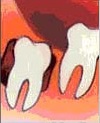The Wisdom Tooth
 Impacted 3rd Molar
Impacted 3rd Molar
What is meant by 'impacted wisdom tooth'?
A tooth (any tooth) becomes 'impacted' when it is blocked from erupting (coming out of the gums).
The blockage can be due to:
In the case of lower wisdom teeth, the most common situation is that the wisdom tooth is tilted forward, and as it erupts, it is blocked by the root or crown of the second molar.
A tooth (any tooth) becomes 'impacted' when it is blocked from erupting (coming out of the gums).
The blockage can be due to:
- Soft tissue of the gums,
- The bone,
- The surrounding teeth.
In the case of lower wisdom teeth, the most common situation is that the wisdom tooth is tilted forward, and as it erupts, it is blocked by the root or crown of the second molar.
Read more in
Wisdom Teeth - Are We Wiser Without Them?
Surgical After Care
Information about Surgical procedures
Medisave
Wisdom Teeth - Are We Wiser Without Them?
Surgical After Care
Information about Surgical procedures
Medisave
 Tooth Decay
Tooth Decay
How does an impacted lower wisdom tooth cause problems?
The most problematic, and unfortunately, the most common situation is where a lower wisdom tooth partially erupts tilted forward rather than vertically, and becomes impacted against the second molar.
This commonly creates a large space between the 2 teeth that traps food and which is extremely difficult to brush or floss because of the rough surface of the wisdom tooth.
The most problematic, and unfortunately, the most common situation is where a lower wisdom tooth partially erupts tilted forward rather than vertically, and becomes impacted against the second molar.
This commonly creates a large space between the 2 teeth that traps food and which is extremely difficult to brush or floss because of the rough surface of the wisdom tooth.
 Gum Infection
Gum Infection
The common outcomes of this situation are
Upper wisdom teeth can also be impacted and cause the same sort of problems.
- Caries (tooth decay) on the root of the neighbouring tooth (i.e. the second molar) and sometimes the wisdom tooth
- Gum infections (periodontal disease) from food getting stuck in the space and irritating the gum tissue around the space.
Upper wisdom teeth can also be impacted and cause the same sort of problems.
 Gum Disease
Gum Disease
There are also situations where although the wisdom tooth does not provide any benefit to the patient, it is not likely to cause harm. These cases usually involve wisdom teeth that are so deeply buried in the jaw bone that the process of surgically removing them will cause a lot of damage to the bone.
Are there any risks in leaving these buried teeth in place? Of course. In some (rare) cases a cyst may form around the tooth in later life damaging surrounding bone. The cyst can (even more rarely) cause a tumour/cancer.
Are there any risks in leaving these buried teeth in place? Of course. In some (rare) cases a cyst may form around the tooth in later life damaging surrounding bone. The cyst can (even more rarely) cause a tumour/cancer.
